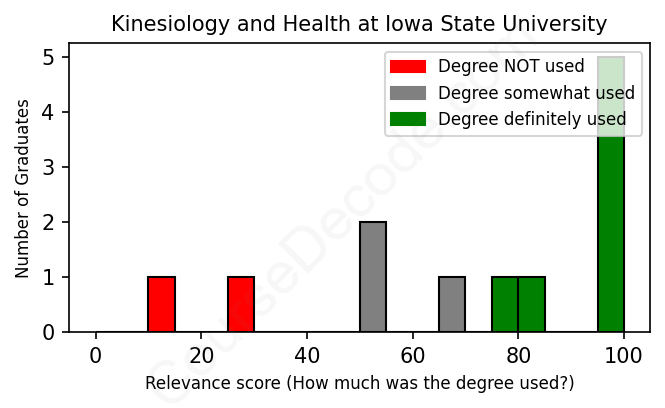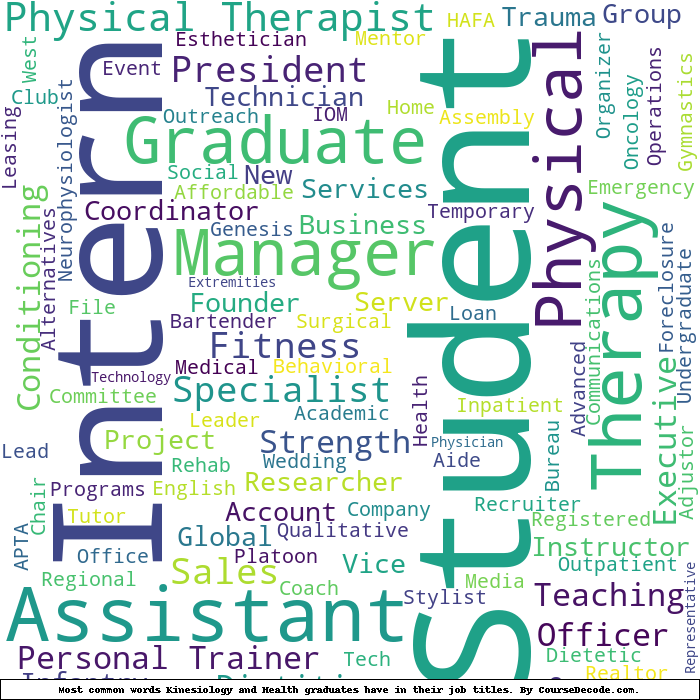
First, some facts. Of the Kinesiology and Health graduates from Iowa State University we've analyzed , here's how many have used (or NOT used) their degree in their career:

These are estimates based on AI analysis of 12 LinkedIn profiles (see below).
The verdict? Slightly above average. Overall, with an average relevance score of 71%, Kinesiology and Health graduates from Iowa State University have a slightly higher likelihood (+4%) of finding work in this field compared to the average graduate across all fields:
And for comparison, here's the chart for all profiles we've looked at across all degrees.
Also, after graduating, 41% of these graduates have pursued further education other than another Bachelor's degree (such as a Masters degree or other), compared to the average across all profiles of 35%. This suggests you may need more than just a Bachelors degree to be competitive as a Kinesiology and Health graduate.
See the details:
|
Relevance score: 100% We think this person has gone into a career highly relevant to their degree. We think this person has gone into a career highly relevant to their degree.
DEGREE INFOGraduated in 2014 from Iowa State University with a Bachelor of Science (BS) in Kinesiology and Health. No other secondary education since. JOB HISTORY SINCE GRADUATIONAcademic Tutor/Mentor Iowa State Athletics Department Jan 2014 - Present ABOUTExpected to graduate May 2014 with a degree in Kinesiology and Health from Iowa State University and will be attending Northwestern University Physical Therapy school in September 2014 |
The top 10 most common jobs done by the graduates we've analyzed (ranked most common to least) are:
From the data collected, it seems that a lot of people who graduated with a Kinesiology and Health degree from Iowa State University ended up in jobs that are closely related to their field of study. Many individuals worked as Strength and Conditioning Coaches or Personal Trainers, roles that utilize their expertise in exercise science and human physiology. There’s also a strong representation of professionals in therapy and rehabilitation, with many securing internships and jobs in esteemed institutions like the Mayo Clinic. This shows that these graduates are applying what they've learned in a practical way that benefits others, particularly in fitness and health-related settings.
On the flip side, it’s worth noting that not everyone found roles directly tied to Kinesiology and Health. Some graduates veered into fields like sales and event planning, where their degree wasn't particularly relevant. Positions like Office Managers and Academic Tutors, while they may draw on some general health knowledge or communication skills, often don't require specialized kinesiology expertise. So, while there's a solid core of professionals successfully working in relevant fields, there’s also a good number who ended up in jobs that aren’t closely related to their education. It looks like a mixed bag overall, with a slightly stronger trend towards jobs that utilize their degree, especially in fitness and rehabilitation sectors.
Here is a visual representation of the most common words in job titles for Kinesiology and Health graduates (this is across all Kinesiology and Health graduates we've analyzed, not just those who went to Iowa State University):

Looking at the career trajectories of graduates from Iowa State University with a degree in Kinesiology and Health, it’s clear that many have started off in roles that are quite relevant to their studies, particularly in the fitness and rehabilitation sectors. For those graduating around 2010 to 2014, we see a mix of early jobs related to strength and conditioning, personal training, and physical therapy internships. Many of these graduates have continued on to solid careers in physical therapy and rehabilitation settings, with several functioning as Physical Therapists or in supportive roles within health services a few years later. This shows a strong linkage between their education and their career paths, which is a great sign for anyone considering this degree.
However, not all graduates are sticking strictly to Kinesiology and Health-related roles long term. For example, some have branched out into areas like event organizing, sales, and even real estate, which don’t directly relate to their degree. Still, the majority, especially those who have pursued further training, seem to find rewarding careers in health and fitness, becoming personal trainers, physical therapists, or gaining managerial roles in fitness facilities. It’s a mixed bag, but overall, it looks like graduates who are dedicated to the field are carving out successful careers while others pivot into different industries over time. If you’re considering this degree, you can definitely find a fulfilling path in health, fitness, or rehabilitation—just be aware that some might choose to take a different route.
Honestly, a Bachelor’s degree in Kinesiology and Health can be a mixed bag when it comes to difficulty, and it usually lands somewhere around the average level of intensity for a college degree. At Iowa State University, you'll encounter a decent mix of science classes, like anatomy and physiology, and practical applications, which can be challenging but also exciting if you’re into sports and health. If you put in the effort and stay organized, it’s totally manageable, but be prepared for some tough assignments and tests along the way. Overall, if you're passionate about the subject, it can be a really rewarding experience, even if you hit some bumps!
Most commonly, in the LinkedIn profiles we've looked at, it takes people 4 years to finish a Bachelor degree in Kinesiology and Health.
Looking at these Kinesiology and Health graduates from Iowa State University, it seems like some of them are doing pretty well, while others might not be raking it in quite as much. The ones who landed roles as physical therapists or fitness managers seem to have better prospects since those jobs usually pay decently, especially with more experience. On the flip side, folks like the Loan Adjustor Specialist and Office Manager might be earning a little less, given the typical pay scales in those fields. Overall, it looks like there’s a mix of salaries here, but many are carving out solid careers in health and fitness, which can lead to good earnings down the line!
Here is a visual representation of the most common words seen in the "about" section of LinkedIn profiles who have a Bachelor degree in Kinesiology and Health (this is across all Kinesiology and Health graduates we've analyzed, not just those who went to Iowa State University). This may or may not be useful:

Here are all colleges offering a Bachelor degree in Kinesiology and Health (ordered by the average relevance score of their Kinesiology and Health graduates, best to worst) where we have analyzed at least 10 of their graduates:
| College | Score | Count |
|---|---|---|
 Iowa State University Iowa State University
|
71 | 12 |